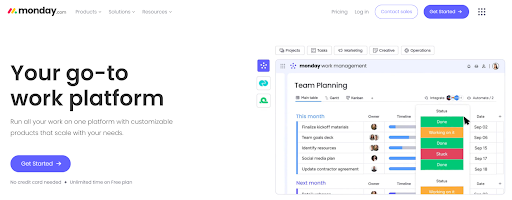The Impact Of Operation Management On Agency Efficiency And Productivity
At its core, operations management involves overseeing, designing, and controlling the processes that transform inputs into goods and services. For agencies, this discipline is essential as it dictates how efficiently resources are utilized to meet client demands and organizational objectives.
Author:Finn WildeReviewer:Michael RachalJul 02, 20241.8K Shares135.4K Views

At its core, operations management involves overseeing, designing, and controlling the processes that transform inputs into goods and services. For agencies, this discipline is essential as it dictates how efficiently resources are utilized to meet client demands and organizational objectives.
Efficient operations management is not merely a logistical necessity but a strategic advantage. It encompasses the methodologies and practices that streamline workflows, optimize resource allocation, and enhance overall productivity.
What Is Operations Management?
Operations management in agency settings refers to the comprehensive approach of planning, organizing, coordinating, and controlling resources to achieve specific goals. It involves strategic decision-making to ensure that every aspect of agency operations contributes to its overall success.
From managing human resources and finances to optimizing processes and technologies, operations management encompasses a wide array of disciplines essential for agency efficiency.
Key components of operations management include:
- Planning: Strategizing and setting objectives that align with agency goals.
- Organizing: Structuring resources and activities to achieve planned objectives.
- Coordinating: Ensuring seamless collaboration between departments and stakeholders.
- Controlling: Monitoring performance, identifying deviations, and implementing corrective measures to maintain efficiency.
The Role Of Operations Management In Agency Efficiency
Effective operations management is the cornerstone of agency efficiency. It plays a crucial role in enhancing workflow processes and minimizing inefficiencies that can otherwise hinder productivity.
By implementing robust operations management practices, agencies can streamline their operations, reduce costs, and improve service delivery.
Without effective operations management, agencies frequently encounter several inefficiencies. These include delays and bottlenecks in workflow caused by inadequate resource allocation or breakdowns in communication.
Mismanagement of resources often leads to unnecessary costs and underutilization of available assets, contributing to financial inefficiencies.
Inconsistent service delivery or product quality may arise due to the absence of standardized processes or insufficient monitoring mechanisms, undermining overall operational effectiveness and customer satisfaction.
Factors Influencing Agency Productivity
Agency productivity is influenced by a multitude of factors, both internal and external. Understanding and effectively managing these factors are crucial for sustaining high levels of efficiency and operational effectiveness.
Internal factors directly under the agency's control significantly impact productivity:
- Organizational Structure: The way departments and teams are structured can either facilitate or hinder communication and collaboration.
- Employee Skills and Training: Well-trained and skilled employees contribute to higher productivity and quality of work.
- Technology and Infrastructure: Up-to-date technology and efficient mailroom managementinfrastructure streamline operations and enhance productivity.
- Company Culture: A positive and supportive company culturefosters employee satisfaction and productivity.
- Management Practices: Effective leadership and management practices ensure clarity of goals and efficient use of resources.
External factors beyond the agency's control also influence productivity:
- Market Conditions: Economic fluctuations, market demand, and industry trends affect agency workload and resource allocation.
- Regulatory Requirements: Compliance with regulatory standards impacts operational processes and resource allocation.
- Competitive Landscape: The actions and strategies of competitors can influence market position and operational efficiency.
- Supplier and Partner Relationships: Collaborative relationships with suppliers and partners can affect the availability and cost of resources.
Importance Of Streamlined Operations
Streamlined operations are indispensable for agencies seeking to effectively address challengesposed by various factors. By optimizing workflows, agencies can achieve several key advantages:
Efficiency gains are substantial, as streamlined operations minimize time wastage and optimize resource allocation, thereby boosting overall productivity and operational efficiency.
Cost savings are significant, as efficient operations management reduces unnecessary expenses, leading to lower operational costs and increased profitability for agencies.
Quality improvement is ensured through standardized processes and workflows, which consistently deliver high-quality services or products, enhancing customer satisfaction and loyalty.
Adaptability is facilitated by agile operations, enabling agencies to swiftly respond to shifting market conditions and evolving customer expectations, maintaining competitiveness and responsiveness in their industry.
Benefits Of Implementing Operations Management
Implementing effective operations management practices yields several advantages for agencies:
- Enhanced Efficiency: Streamlined processes and optimized resource allocation result in higher productivity and reduced operational bottlenecks.
- Improved Quality: Standardized workflows and quality control measures ensure consistent delivery of high-quality products or services.
- Cost Reduction: Efficient operations management minimizes waste and lowers operational costs, contributing to improved profitability.
- Better Decision-Making: Data-driven insights and performance monitoring enable informed decision-making and strategic planning.
- Scalability: Scalable operations management practices support growth and expansion without compromising efficiency or quality.
Examples of successful implementation of operations management include:
Amazon:Known for its efficient supply chain management and operational excellence, enabling rapid delivery and customer satisfaction.
Toyota:Pioneered the Toyota Production System, emphasizing lean manufacturing principles to optimize efficiency and minimize waste.
Zappos:Focused on customer service excellence through streamlined operations and a strong company culture, resulting in high customer satisfaction and retention.
Best Operations Management Software Solutions For Agencies
Choosing the right operations management software is critical for enhancing efficiency and optimizing workflows within agencies.
Trello
Trello is renowned for its user-friendly interface and robust task management capabilities. This platform utilizes a card and board system, allowing teams to visually organize and prioritize their tasks effectively.
Trello's simplicity makes it suitable for teams of all sizes, providing an intuitive experience that requires minimal training. The platform supports various integrations with other tools like Slack,
Google Drive, and Dropbox, enhancing its functionality and adaptability to different workflows. Trello also offers features such as due dates, checklists, and labels, which help in tracking progress and ensuring that all team members are aligned on project goals.
Asana
Asana offers comprehensive project management features, making it ideal for handling complex projects. Asana's ability to create task dependencies ensures that teams can manage interrelated tasks seamlessly, avoiding bottlenecks and ensuring timely project completion.
The platform's timeline tracking feature provides a visual representation of project schedules, enabling managers to see overlaps, deadlines, and potential delays at a glance.
Asana also includes advanced search and reporting tools, which help in monitoring project performance and making data-driven decisions. Its versatility allows teams to customize their workflows according to specific project needs, from simple to highly complex tasks.
Monday.com
Monday.com excels in providing customizable workflows and automation features, which significantly streamline project management and team collaboration. With Monday.com, agencies can build tailored workflows that fit their unique processes, using an array of templates and automation tools to reduce manual work.
The platform's visual dashboards offer real-time insights into project status, resource allocation, and team performance. Additionally, Monday.com supports integration with various tools such as Microsoft Teams, Zoom, and Jira, which helps in creating a cohesive digital workspace.
Its automation capabilities allow users to automate routine tasks, such as sending notifications or updating task statuses, thereby improving efficiency and allowing teams to focus on more strategic activities.
Features And Functionalities Agencies Should Consider
- Task Management: Ability to create, assign, and track tasks across teams and projects.
- Collaboration Tools: Features for real-time communication, file sharing, and collaboration among team members.
- Automation: Workflow automation to streamline repetitive tasks and improve efficiency.
- Integration Capabilities: Compatibility with other tools and platforms commonly used within the agency ecosystem.
- Reporting and Analytics: Tools for performance monitoring, data visualization, and decision support.
Comparison Of Different Solutions
- Scalability: Evaluate how well the software can accommodate growth and increased workload.
- Integration Capabilities: Assess compatibility with existing software and systems used by the agency.
- User-Friendliness: Ease of use and accessibility for team members with varying levels of technical expertise.
- Cost and Value: Consider the pricing structure, including subscription plans and additional features offered.
Effective operations management is pivotal for agencies, driving efficiency through streamlined workflows and optimized resource utilization.
By strategically planning, organizing, coordinating, and controlling operations, agencies can enhance productivity, reduce costs, and deliver consistent, high-quality services.
Embracing robust operations management practices not only supports day-to-day efficiency but also positions agencies to adapt and thrive amidst evolving market dynamics and customer expectations.

Finn Wilde
Author
For Finn Wilde, the wilderness is more than just a destination - it’s a way of life. Over the past decade, he has led multiple expeditions in some of the world’s most remote regions, from the icy fjords of Greenland to the rugged trails of Patagonia.
Finn emphasizes sustainability in all of his adventures, helping participants connect with nature while promoting responsible exploration. His expeditions inspire individuals to explore the great outdoors while fostering a deep respect for the environment.

Michael Rachal
Reviewer
Michael Rachal believes that luxury lies in the details. With over 20 years of experience in the luxury travel industry, he has crafted hundreds of bespoke itineraries for clients seeking personalized, unforgettable experiences.
Whether guiding clients through private cultural tours or curating culinary journeys with world-renowned chefs, Michael ensures that each trip is tailored to perfection.
His ability to anticipate needs and exceed expectations has earned him a reputation as a leading expert in luxury travel.
Latest Articles
Popular Articles



